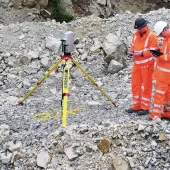Maintaining the economic momentum

Fifth MPA Members’ General Assembly focuses on ‘Maintaining Momentum’ of economy
THE 5th annual Mineral Products Association (MPA) Members’ General Assembly, which took place on Wednesday 11 June at Church House, Westminster, with the theme ‘Maintaining Momentum’, attracted over 120 high-level delegates from more than 60 MPA producer and associate member companies.
The event was hosted by Simon Jack, BBC Radio 4’s ‘Today’ programme business correspondent, and featured two interactive business panel sessions with several high-profile expert speakers from Deutsche Bank, HM Treasury, the University of Oxford/Natural Capital Committee and the Department of Transport.
Nigel Jackson, chief executive of the MPA, said: ‘In the last five years I believe that what we have achieved on health and safety, carbon reduction, biodiversity, responsible sourcing, sustainable development, design of the built environment and improved external perception is profound because it is now evidence based and measured.
‘It is only through our unity, our evidence, our consensus that we begin to touch the lever marked influence.
‘Looking forward, we have initiated ‘MPA 2020’ to challenge ourselves as to what kind of industry we want to be, and become, over the next five years. We have made a good start to the MPA story, we have aligned and are aligning once disparate sectors, we have and are realizing the synergies, but it is just a start. I am confident that if stay together we can now move from base camp to far higher levels.’
The two interactive business panel sessions, led by Simon Jack, looked at the economy and infrastructure.
In the first session, Jerry McLaughlin, director of economics & public affairs at the MPA; Dr George Buckley, senior UK Economist with Deutsche Bank; and Dave Ramsden, chief economic advisor and head of government economic service at HM Treasury, discussed whether recovery in the economy and industry markets would be sustained, and the threats to future growth.
Dr Buckley highlighted that the economic recovery was based on very low levels of activity and that, in this context, a 3% growth rate this year was not too surprising. He pointed out that the UK recovery was stronger than most other economies and was starting to show signs of rebalancing, but raised some questions about what would be driving growth when government supports for the economy were scaled back.
Mr Ramsden highlighted that government was very committed to supply-side policies to encourage growth and to continuing investment in infrastructure. He said that the performance of industries such as aggregates provided an early indicator of wider economic performance.
In the second panel session, Prof. Dieter Helm CBE of the University of Oxford and chairman of the Natural Capital Committee; and Phillip Rutnam, Permanent Secretary at the Department of Transport, discussed UK energy policy and transport investment plans.
Prof. Helm said that energy policy in recent years had not worked and, as a result, the UK was facing a combination of increasing energy costs, higher carbon emissions and lower security of supply at a time when international wholesale electricity prices were likely to decline.
Mr Rutnam highlighted the significant investments government was now making in transport, including the Crossrail project; preparations for future rail investment, such as HS2; and the major increases planned for the Highways Agency.









